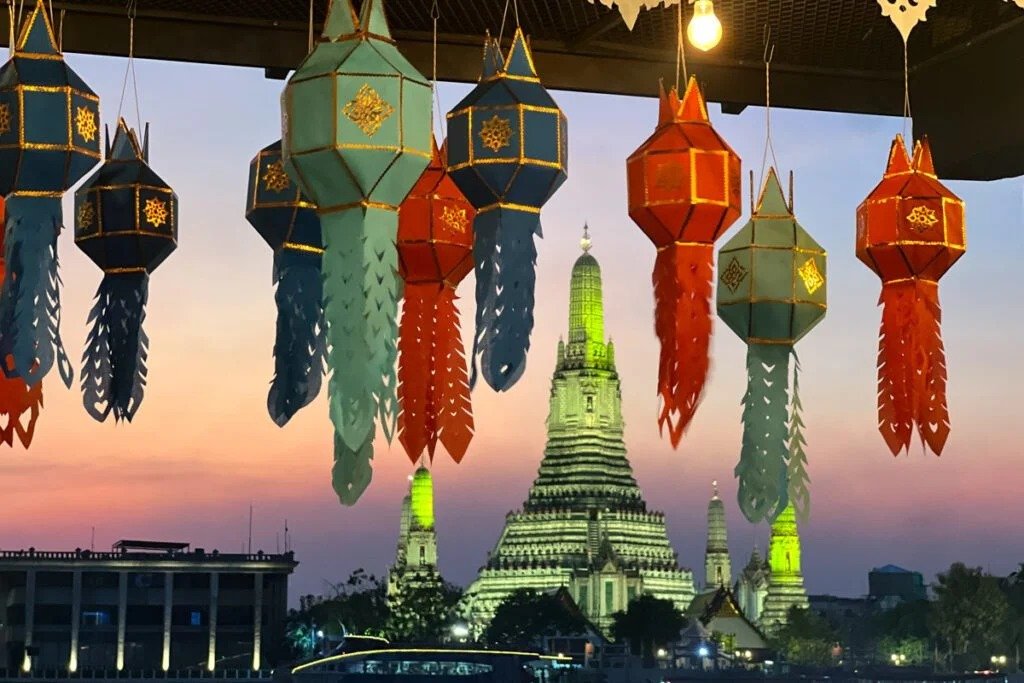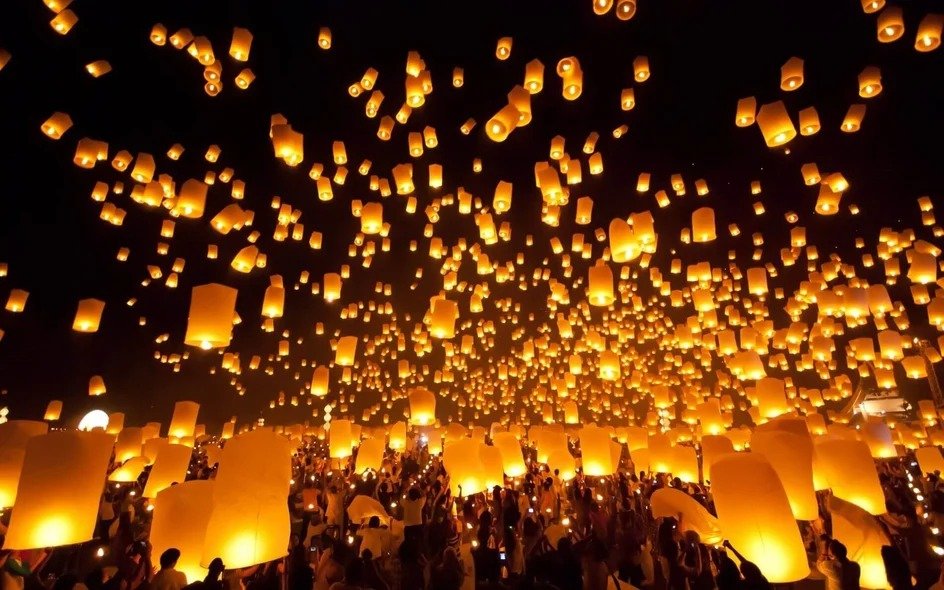2024Thailand is a country rich in culture, tradition, and vibrant celebrations. Throughout the year, the Land of Smiles hosts several cultural festivals that unite locals and tourists in joyous unity. These festivals are steeped in tradition, often tied to religious events, agricultural cycles, and historical customs that define the spirit of Thailand. In this article, we explore seven of Thailand cultural festivals that you shouldn’t miss on your next visit.
Read more: Top 10 destinations in Thailand
Songkran Festival: The Joyful Thai New Year Celebration
Songkran IS One of Thailand cultural festivals, celebrated annually from April 13-15, and is perhaps the most famous cultural event in the country. Known as the Thai New Year, Songkran is a celebration marked by water fights, where locals and tourists alike take to the streets with buckets, water guns, and hoses, joyously drenching one another. The water symbolizes the cleansing of the past year’s sins and the washing away of bad luck in preparation for a fresh start.
Songkran isn’t just about water fights, though. The festival has deep cultural and religious significance. Traditionally, Thai families visit temples to offer food to monks, pour water over Buddha statues, and seek blessings for the year ahead. Many families also honor their elders by gently pouring fragrant water over their hands in a show of respect. In Chiang Mai, one of the best places to celebrate Songkran, the old city turns into a massive water battleground, while in Bangkok, traditional ceremonies at temples like Wat Pho balance the festivities with a peaceful reverence.
Find out now: A Culinary Journey: The Best Thai Street Food
Loy Krathong: The Thailand Cultural Festival of Lights and Floating Lanterns
Loy Krathong is one of Thailand cultural festival, celebrated nationwide on the full moon of the 12th lunar month, usually in November. The name “Loy Krathong” translates to “float a basket,” and during this festival, people release small decorated baskets (krathongs) into rivers, lakes, and canals as an offering to the water spirits and to apologize to the river goddess for any misdeeds.
The floating baskets are made from natural materials like banana leaves, flowers, and candles. As the krathongs drift away, they carry the wishes and prayers of those who set them afloat. In addition to the floating krathongs, the night skies are illuminated by fireworks and lanterns, creating a magical, ethereal atmosphere.
Chiang Mai, Sukhothai, and Bangkok are particularly famous for their grand Loy Krathong celebrations, as Sukhothai is considered the birthplace of the historic festival and one of the most famous Thailand cultural festivals.
Exploring Thailand hidden gems
Yi Peng: Chiang Mai’s Mesmerizing Lantern Festival
Coinciding with Loy Krathong in northern Thailand, particularly in Chiang Mai, is the Yi Peng Lantern Festival. Yi Peng is an ancient Lanna tradition in which thousands of paper lanterns (khom loy) are released into the sky, symbolizing the release of misfortune and the welcoming of good luck and positive energy. The sight of thousands of glowing lanterns ascending into the night sky is a truly mesmerizing experience and one of the most breathtaking Thailand cultural festivals in the world.
Visitors to Chiang Mai during Yi Peng can partake in the celebrations by crafting and launching their lanterns, making it a deeply personal and magical experience. The festival also features traditional dance performances, parades, and Buddhist merit-making activities.
It’s a time of beauty, reflection, and spiritual renewal, with many people writing their hopes and wishes for the future on their lanterns before sending them into the sky.

Phi Ta Khon: The Colorful Ghost Festival of Dan Sai
The Phi Festival is one of the most famous Thailand cultural festivals, The Phi Ta Khon Festival is held in the small town of Dan Sai in Loei Province. It is a unique and lively festival and is part of the larger Bun Luang Festival. Often referred to as the Ghost Festival, it takes place over three days in June or July, depending on the local lunar calendar. The origins of the festival are linked to local folklore, where spirits are said to have followed Buddha on his return journey to Earth after reaching enlightenment.
During Phi Ta Khon, locals wear elaborate masks and costumes designed to resemble playful, ghostly spirits. The parade is one of the highlights of the festival, with participants dancing through the streets, donning brightly painted masks made of coconut husks and bamboo, while jingling cowbells tied around their waists. The festival is a joyous celebration, but it also incorporates Buddhist rituals, including the launching of rockets to bring rain for the crops and blessings for the community.
Boon Bang Fai: The Fiery Rocket Festival in Isaan
One of the most famous Thailand cultural festivals is the Bon Pang Fai Rocket Festival, which is held in the Isan region in northeastern Thailand, and is one of the most exciting and exciting festivals in the country. This festival is celebrated in May, just before the rainy season, and revolves around launching homemade rockets into the sky to encourage the rain gods to bless the area with rain for the crops.
The rockets, some of which can be up to six meters long, are hand-crafted by teams of local artisans and are launched into the sky amidst much fanfare, music, and dancing. The festival has a competitive edge, as teams compete to see whose rocket can fly the highest and longest. The excitement is palpable, and the celebration also includes traditional folk music, beauty pageants, and street parades, making it a fun, vibrant event that draws crowds from all over Thailand.
Vegetarian Festival: Phuket’s Spiritual and Ritualistic Celebration
Phuket’s annual Vegetarian Festival celebrated during the ninth lunar month of the Chinese calendar (usually September or October), is one of the most intense and spiritually charged Thailand cultural festivals.
This nine-day festival is deeply rooted in the Chinese Taoist belief in spiritual purification through abstinence from meat, alcohol, and other indulgences. Devotees wear white and strictly follow a vegetarian or vegan diet throughout the festival to cleanse both body and soul.
What makes this festival unique, however, are the extreme acts of devotion and self-mortification performed by some participants, known as “mah song.” These acts include walking on hot coals, climbing ladders made of blades, and piercing their bodies with sharp objects. The belief is that these acts demonstrate the mah song’s possession by the gods, who protect them from pain. Processions through the streets of Phuket are accompanied by firecrackers, drums, and prayers, creating a highly charged atmosphere of spiritual fervor.
Read more: A Gem in China Town: Lhong Tou Café
Royal Ploughing Ceremony: A Traditional Blessing for Thailand’s Agriculture
The Royal Ploughing is one of Thailand cultural festivals, Ceremonies are an ancient Brahmin and Buddhist ritual that marks the beginning of the rice-growing season in Thailand. Held in May at Sanam Luang near the Grand Palace in Bangkok, this ceremony is a state event presided over by members of the royal family. The ceremony involves sacred oxen plowing a furrow in a symbolic act of planting rice seeds, with predictions made based on the behavior of the oxen regarding the forthcoming agricultural season.
The Royal Ploughing Ceremony has great significance in Thailand, where agriculture remains a vital part of the economy. Farmers from all over the country gather to watch the ceremony, and the rice seeds used during the ritual are considered highly auspicious, often kept as good-luck charms for the coming harvest. The ceremony highlights Thailand’s deep respect for tradition, the monarchy, and the agricultural roots that still define much of the nation’s identity.
Conclusion
Thailand cultural festivals are as diverse as the country itself, offering visitors the chance to experience both the vibrant energy and deep spiritual roots that make the Land of Smiles so unique. From the joyous water fights of Songkran to the serene beauty of Loy Krathong and Yi Peng, and the colorful ghostly celebrations of Phi Ta Khon, these festivals provide a window into the heart of Thai culture. Whether you’re seeking adventure, spiritual reflection, or simply a deeper connection with the local customs, Thailand’s festivals offer something for everyone. Plan your visit around one of these remarkable celebrations, and you’ll walk away with unforgettable memories and a deeper appreciation for Thailand’s rich cultural heritage.


Comment (0)